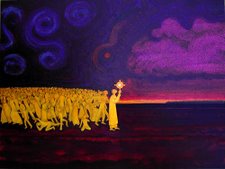By Joseph O'Leary, S.J.
[EXCERPT]
...Christians judge the Bible not only from the standpoint of the modern conscience, but also under the impulsion of the Holy Spirit. The real, spiritual authority of Scripture – its capacity to elicit faith and inspire hope – emerges when they wrestle with it in prayer and loving debate. They are moved to correct, in charity, Paul’s occasional sexist, homophobic or anti-Semitic remarks, but they do so in order to free the core teachings of the Apostle and make them audible today. They work on biblical traditions, cleansing them of their toxins, in order to retrieve them as living traditions for today.
The Christian Church has always enjoyed freedom over against Scripture, seeing it as a book to be used. Revelation is not handed to one on a plate; it is an event that occurs when one reads Scripture in community and in dialogue with the “signs of the times”, the phenomena of human joy and hope, war and reconciliation, need and promise, which were an essential point of reference in the theological thinking of the Hebrew prophets and which were again pointed to as an essential frame of reference by Vatican II. The theological claims about inspiration and inerrancy must be nuanced and modified in light of the actual dealings of the community with the hallowed text. These dealings have always been marked by selectivity; the community has trusted in its own instincts and in the leading of the Holy Spirit in deciding which texts in Scripture spoke loudly and clearly and which others were best consigned to a decent obscurity.
For Christians the New Testament has been Scripture in a more immediate sense than the old (as Joseph Ratzinger insists, in K. Rahner and J. Ratzinger, Revelation and Tradition, New York, Herder and Herder, 1966), and its message has not been passed through the filter of allegorization and other domesticating devices. Thus it is harder for Christians to attain a critical distance over against the New Testament. But gradually we are realizing that no written words can be immediately identified with the Word of God. The words of Scripture are exposed to all the vicissitudes of ancient historical writings, even at the level of textual transmission, and even such sublime writers as Paul and John were men of their time, using conceptual instruments that no longer fit contemporary mentalities. With Karl Barth we come to see Scripture as attesting the Word of God, as a trace left by the long wrestling with the divine of the peoples of the old and new Covenants. We continue to develop that tradition, but critically, not taking any text of the past as a blueprint to be followed blindly. The same Spirit that confers on Scripture its power is at work in the use and interpretation of Scripture in the Church today.
Fundamentalists in the Anglican Communion accuse alleged liberals of rejecting the sovereign authority of Scripture over Church. Yet the Church has always lived in a perichoretic relationship to Scripture. Scripture founds the Church and embraces it; yet it is the Church that established the Canon of Scripture and it is the present community of faithful who embrace Scripture with their understanding and bring forth its sense for today. What in Scripture becomes obtuse and unmeaningful cannot be cited as exemplifying that authority which Scripture has over the Church. There is no need to seek divine meaning in words that can perfectly well be explained by reference to the mores and mindsets of the ancient cultures in which they were formulated.
The Bible is a record of growth in the understanding of God from a primitive beginning, but the continuation of that growth depends on our own mature and responsible reading of the Bible. The Bible is a fictional machine for making God speak, by putting him on the stage in dialogue with human agents. Unless the dialogue continues today, the voice of God in Scripture becomes a dead letter, or a crushing imposition.
Magical thinking stands in the way of this mature Christian use of Sacred Scripture. Such thinking embraces a literal understanding of scriptural sentences ripped from their contexts and thought to be transparently meaningful today. The sentences may be sheer absurdities – but that makes them all the more satisfying to one who brings the heuristic approach of magical thinking. A classic instance of magical literalism is Origen’s alleged implementation of the Gospel saying about becoming eunuchs for the sake of the Kingdom.
To be sure, an element of magical thinking may be essential to religion: icons, relics, texts are merely what they are, but devoted love projects onto them numinous power, and they then indeed do become sites of healing and illumination. We must not banish such magic, but must translate it from the register of irrationality or superstition into that of a wise handling of “skilful means”.
Some will resist the application in scriptural hermeneutics of wimpy contemporary notions of political correctness. They are happy that Scripture is so full of blood, as it ensures the realism of the scriptural record. Mel Gibson’s film The Passion of the Christ, is praised on similar grounds, as bringing the terror of demonic violence, as unleashed against Christ, closer to modern consciousness. A sanitized Bible, pacifist and feminist and gay-friendly, would be as tasteless as the Pali Canon.
Yet the bloodlessness of Buddhist scriptures speaks a quiet word of reproach to us, urging us to advance to a new level of critical discernment in handling our own scriptures. Gloating over the defeat of enemies, even if they are God’s enemies, and reveling in threats and fantasies of punishment, are attitudes that belong to a warlike culture. Scripture was born within such a culture, but ultimately tends to its overcoming, just as Buddhism overcomes the warlike culture of earlier Indian religion. CONTINUE
Sunday, August 12, 2007
Subscribe to:
Post Comments (Atom)



2 comments:
thanks for quoting me, but I am not a Jesuit!
Sorry! I somehow assumed you were. You teach at a Jesuit University, right? All the best, Kevin
Post a Comment